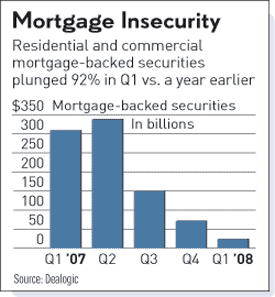
A few years ago, I was having lunch with a bunch of investment bankers, who were talking about onion cheeseburgers for breakfast (ok, so I am exaggerating), mortgage liquidity and credit. The conversation quickly turned to the rating agencies and engulfed the conversation for the entire lunch. Not being from The Street I was taken aback by the venom showered on the ratings agencies.
Their was lack of respect for their independence and inability to keep up with the financial market sophistication in their models (of course we now know that no one could keep up with the sophistication) as it related to mortgage related securities.
If an agency generates a low rating, the deal doesn’t get done and the agency doesn’t get future work from the bank. (It sounded very much like the relationship between appraisers and mortgage brokers so I could relate.)
How can credit markets be based on ratings by parties incentivized to be encouraging more transactions volume, and therefore more fees? In other words, how can there be objectivity? Now understood, logic says that investors would be hesitant to return to the party until this glaring issue is fixed. And therefore mortgage liquidity will remain limited.
According to today’s page one WSJ story, As Housing Boomed, Moody’s Opened Up the housing market boom changed their culture.
>A decade ago, as the housing market was just beginning to take off, Moody’s was a small player in analyzing complex securities based on home mortgages. Then, Moody’s joined Wall Street and many investors in partaking of the punch bowl.
>A firm once known for a bookish culture began to focus on the market share that affected its own revenue and profit. The rating firm became willing, on occasion, to switch analysts if clients complained. An executive overseeing mortgage ratings went skydiving with a client. By the height of the mortgage-securities frenzy in 2006, Moody’s had pulled even with its largest competitor, rating nine out of every 10 dollars raised in these instruments. It gave many of the bonds its coveted triple-A rating.
Securities rated as safe to buy, have lost $100B
>Now, Moody’s and the other two major rating firms, the Standard & Poor’s unit of McGraw-Hill Cos. and the Fitch Ratings unit of Fimalac SA, are under fire for putting top ratings on securities that ultimately collapsed in value. Investors, many of whom relied on ratings to signal which securities were safe to buy, have lost more than $100 billion in market value. The credibility of the ratings system is in tatters as new downgrades of mortgage securities come almost weekly. Investigators from Congress, the Securities and Exchange Commission and several state attorneys general are examining the rating firms’ practices.
The article seems to suggest that the recent troubles are because:
>[The CEO] created a dialogue between Moody’s and the Street that was good,” says Paul Stevenson, a former Moody’s executive who now works at BMO Financial Group. But “the most recent problem,” he says, “is that the rating process became a negotiation.”
Regulators want to bring back investor confidence soon and are looking for ways to fix the disconnect. Supposedly there will be regulations addressing the rating agencies and Wall Street banks who split securities into tranches to better manage risk.
Until there is better transparency, the investors may sit on the sidelines and that will keep mortgage rates from falling and will continue to result in greater housing market distress.
>A devilish Boston fan working on a concrete crew at the $1.3 billion stadium covertly buried a Red Sox T-shirt under what will become the visiting team’s locker room to jinx the Yanks
2 Comments
Comments are closed.


Right on the money. Everyone knew of the inherent conflict between the ratings and the need to generate revenue, everyone knew. The ultimate casualty is going to be the investment process that pensions and endowments employ. There may be a new layer created out of this mess – a truly independent advisor – but that will come with a cost. It will impact the pricing as well as liquidity and the system will be more balanced as a result BUT we may have just witnessed the last great consumer driven expansion of the US economy for the next decade or more. Flat screens, kitchen upgrades and $500 gadgets will be cash and carry only. On a lighter note, I am looking forward to actually being able to own 2,000 SF of southern exposure in Manhattan with a view….
I would have to agree with you. Our market here in the Boise area is somewhat steady, but we do have some short sales that we need to clear out before people feel good about buying again. Where are you at specifically? I will send you a referral if I find someone moving that way.